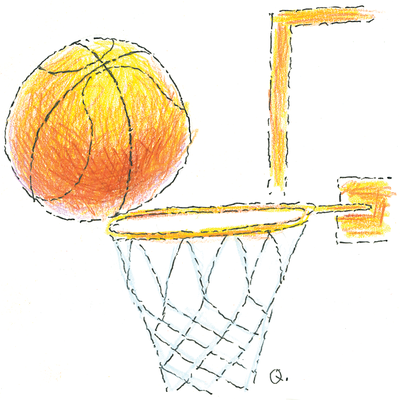Everything is Copy: The arc of the season

It was, I think, simply coincidence that on the anniversary of his death, my interest in college basketball revived. It wasn’t because we shared that passion. Spectator sports held little appeal for him, save, perhaps, il Palio di Sienna, an insane, centuries-old horserace around a Tuscan town square that he was always happy to catch when he visited his father. He pointed out the track as we dined above the piazza last February. He talked about wanting to share that – and so much else – with me on a future visit.
He would have sat with me during Duke games, if I’d asked. He would have made insightful comments about what he saw; he noticed things others missed. But if he hadn’t died I may not have needed to start following the team again.
My love for Duke basketball still surprises me. (I know. You hate Duke. I get it.) In me, it grew stubbornly. The early seeds wouldn’t take, the soil was too hard, too hostile. For the first seven years I lived in Durham, North Carolina, and worked at Duke, I cultivated a distaste for the sport. I don’t just mean I tuned out when the conversation moved to games, or turned down tickets to Cameron Indoor Stadium when offered. Those things I did.
But I also actively railed against basketball culture.
When my colleagues at Duke University Press had conversations about Selection Sunday and bracketology, I was more annoyed than when they rambled on about contextualizing postdialectical hegemonic discourses.
When my then-boyfriend spent hours screaming clichés at the television – “He shoots! He scores!” “He can’t miss!” “Yes! Yes! YES! YESSSSSS!” – I thought, Who are you? And, Should I dump him?
This was the late-’90s, when games regularly went into triple digits, and players rarely left early for the NBA. Dick Vitale would announce SAT scores as often as he would game stats.
I hated basketball. Actively, passionately, and, as it turns out, temporarily.
When I started working in admissions and was charged with revising the university’s viewbook, the propaganda piece sent to tempt prospects into applying to the Gothic wonderland, I interviewed Trajan Langdon, then captain of the team. “The Alaskan Assassin” was double-majoring in math and history.
I said, “No offense, Trajan, but I’m not into basketball.”
He said, “That’s cool,” and then told me what he loved about his sport.
Reader, I fell for him.
Then, I fell for the team.
But mostly, I fell for the fact that I now had a lingua franca, a common language to use in any bar, any gathering, with any person – plumber to philologist. We could spend hours analyzing the game, second-guessing Coach K, screaming at the refs.
Becoming a fan was a gift, as Spokanites – who love the Zags with a zeal I understand though haven’t yet come to share – well know. We get to watch talented young people perform coolly under real world pressure, to learn their stories, to invest heavy in something whose stakes are, for us fans, in fact quite low. We get to share successes and grief with friends and strangers.
For the dozen years I’ve lived in Spokane, my fandom has been dormant. I don’t like watching alone, and, you understand, it’s lonely being for Duke. But at the end of this season, while at the ski hill, I convinced friends to watch a few games.
Zion Williamson! Coach K’s snarling face and inky, immutable hairdo! The threes! The rebounds! The blocks! Zion! The stress! The heartbreak!
Being a fan creates a different relationship to time. Twenty minutes stretches to an hour; the final few seconds last an eternity. You want the game to be over and you never want it to end. You inhabit every moment, suspended from the rest of the world. The outcome can change in an instant.
A year ago, my life changed in an instant when the man I loved failed to make a turn and drove his car into a tree. Since then, I’ve watched the person who answers to my name stagger through daily life. I’ve been confounded by some of my responses, have come undone when offered small kindnesses. I’ve awakened to how much I missed, how much I’ve gotten wrong. Every day I think: The people you love could die, suddenly, unexpectedly. Say what needs to be said. Say it now.
After Duke went out, I watched the rest of the tournament with profligate and capricious devotion. I’d pick a team and then, again, I’d ache with defeat. Perhaps it’s because the winter had been too cold, too gray. Perhaps I needed the knife edge of sport, the clarity of a zero-sum game, to slice through my cocooned state. Perhaps I just needed a different place for my tears to land.
College basketball at the end of this season gave me something unexpected. To be a fan is to allow yourself simply to feel – deeply and without embarrassment, to dwell in a place beyond words, beyond reason. Loss, in this context, is shared and lasts only until the next game, the next tournament. Loss is agonizing, but bearable.
The arc of the season bends toward spring, toward renewal, toward hope. That is something to remember.
Rachel Toor is a professor of creative writing at Eastern Washington University. She is the author of one novel and five books of nonfiction.